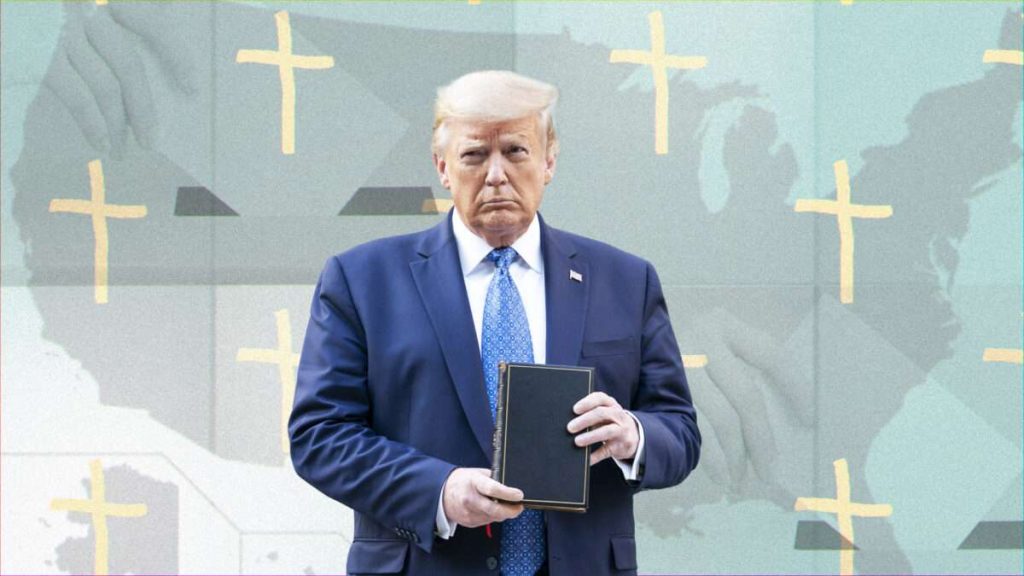About 102 million people of faith—including “32 million self-identified Christians who regularly attend church”—are likely to abstain from voting in November, according to a new study from Arizona Christian University (ACU). Many, including the study’s lead researcher, are encouraging churches to “pull it together” to get their congregations out of the pews and into the polls.
The ACU study indicates that enthusiasm for this election among people of faith—defined as someone who associates with a recognized religion, such as Christianity, Judaism, Mormonism, and Islam—is lower than usual and much lower than in 2020, with 57 percent of respondents offering dislike for both former President Donald Trump and Vice President Kamala Harris as the reason for their apathy. About 55 percent also said none of the candidates reflected their most important views, and half of the expected nonvoters said the election has become too controversial.
The researchers, led by George Barna, director of research at ACU’s Cultural Research Center, surveyed 2,000 adults during August and September 2024. Barna pointed out that more narrowly defined segments of “people of faith” have different expected turnout rates. Among self-identified Christians who regularly attend church services, 32 million are not expected to vote. At least 14 million adults who regularly attend specifically an evangelical church are expected to not vote. An additional 19 million who regularly attend Catholic services are not likely to vote.
There was some indication that this drop-off in enthusiasm from Trump’s faithful fans was possible. The former president has been trying to distance himself from his past anti-abortion statements and policies (to align better with the majority of Americans), but 41 percent of Christians who regularly attend church services told surveyors that abortion was an issue that most significantly influenced who they would vote for (and a majority of whom oppose abortion). In August, Trump faced backlash after initially opposing Florida’s six-week abortion ban, prompting him to later support it. A few weeks later, he posted “My Administration will be great for women and their reproductive rights” on Truth Social. Days later, Trump’s running mate, J.D. Vance, was asked by NBC’s Kristen Welker, “Can you commit…that if you and Donald Trump are elected that you will not impose a federal ban on abortion?” Vance answered, “I can absolutely commit that.”
This attempt to moderate was a bridge too far for some prominent anti-abortion activists, including Lila Rose, the founder and president of Live Action, a nonprofit that claims “the largest digital footprint for the global pro-life movement.” Rose is also a Catholic who advocates banning abortion with no exceptions, opposes the use of in vitro fertilization (another disagreement with Trump), is against birth control, and even says that women who get abortions should receive “criminal penalties.” She retweeted Vance’s comments on a federal abortion ban saying, “If you don’t stand for pro-life principles, you don’t get pro-life votes.”
Of course, plenty of Trump’s religious supporters split with Rose on this point. Many also seem worried by the findings of this study. Barna himself went on The Charlie Kirk Show to discuss the survey’s findings, calling the potentially 41 million “born-again Christian” nonvoters a game-changer. “When you look at who those people would be likely to vote for, by a large margin, they would back Mr. Trump. By their refusal to show up in this election…Mr. Trump is going to be very, very hard-pressed to win.”
The former president has been saying as much for a while, telling a crowd at a Turning Point USA event in July that Christians “don’t vote like they should. They have to vote. If you don’t vote, we’re not going to win the election.”
Barna went on to chastise churches and pastors who don’t want to get involved in politics from the pulpit. “When we looked at ‘what are their churches doing about the election,’ what we discovered is that by and large, their churches don’t want to get involved,” Barna said. “Only 56 percent of Christian churches in the country have even bothered to encourage their people to vote.” He continued, “We’ve really got to pull it together in these last few weeks of the election where Christians can make a huge difference.”
Others agreed. CEO of the National Religious Broadcasters Troy Miller shared a similar reproach on Fox News, first blaming the left for intimidating Christians not to get involved in politics by calling them “Christian Nationalists,” then castigating pastors for not speaking about the election enough. Author Eric Metaxas posted on X, “If your pastor doesn’t INSIST you vote in his next sermon, he may as well preach on the blessings of abortion. It’s the same thing. And if you attend a church like that, you share in the guilt.” (The Jehovah’s Witness denomination would certainly disagree as they explicitly remain neutral in politics.)
Since 1954, the Johnson Amendment has, theoretically, prohibited all 501(c)(3) nonprofit organizations (which includes churches) from endorsing or opposing political candidates. Trump signed an executive order in 2017 intended to allow churches to engage more politically, though it was mostly symbolic. He directed the secretary of the treasury, “to the extent permitted by law,” not to treat speech “about moral or political issues from a religious perspective” as an endorsement for a candidate. However, as executive orders cannot overwrite laws passed by Congress, this did not change the law or its enforcement.
Truth be told, churches have never experienced much grief for violating the Johnson Amendment. As The Washington Post reported, “more than 2,000 mainly evangelical Christian clergy have deliberately violated the law since 2008 as a form of protest against it; only one has been audited by the IRS, and none punished, according to the Alliance Defending Freedom.”
For those familiar with evangelical churches, it’s no secret that sermons are often explicitly political. (As the daughter of an evangelical pastor, I can count on one hand the Sundays I didn’t attend a service during the first 30 years of my life—even while on vacation or doing missionary work overseas.) Congregants regularly sit through preaching against abortion—a topic that, notably, isn’t mentioned in the Bible—or voting for any candidate who supports it under any circumstances. (It’s rare that these political sermons ever focus on the Bible’s calls to be neighborly toward immigrants.)
Some groups are trying to get the IRS to respond to violations of the Johnson Amendment. The Freedom From Religion Foundation (FFRF) has recently asked the IRS to investigate and revoke the nonprofit status of Texas megachurch Lakepointe Church after pastor Josh Howerton preached a sermon titled “How to Vote Like Jesus” on October 6. According to FFRF, the sermon “made it clear that [Howerton] opposed the ‘unrighteous’ Harris-Walz ticket and therefore believed Jesus would have cast his ballot for the ‘flawed’ Trump-Vance campaign to win the election.”
“Churches can’t be allowed to get away with such blatant politicking,” says FFRF Co-President Annie Laurie Gaylor. “They must abide by the same rules as other nonprofits—or lose their tax code privileges.”
The lack of consistent IRS action, even when violations are deliberate and widely publicized, has led to questions about the amendment’s efficacy. Of course, churches are free to be as political as they like, including endorsing candidates—so long as they give up their tax-exempt status. However, given that J.D. Vance recently appeared alongside outspoken Trump-supporting evangelical pastor Lance Wallnau, it’s clear these churches are more inclined to hold onto their tax-free privileges, hoping that a Trump reelection will lead to the long-promised repeal of the Johnson Amendment.
Barna maintains that churches can make a difference without explicitly endorsing a candidate. “This research underscores the fact that [by] simply encouraging people to vote in order to fulfill their biblical responsibility…an estimated five million regular churchgoers would be likely to vote as a result,” Barna says. “That, in itself, could change the outcome of the election.”
The post The Religious Vote Is Waning—And That Could Spell Trouble for Trump appeared first on Reason.com.







